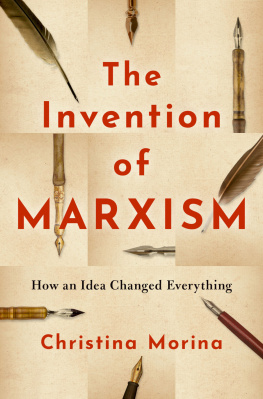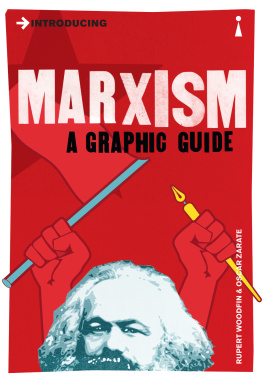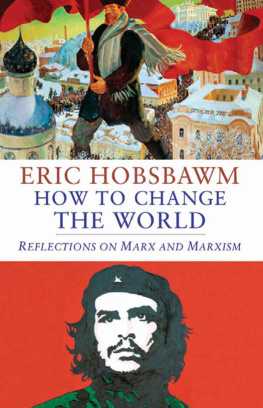THE INVENTION OF MARXISM

Oxford University Press is a department of the University of Oxford. It furthers the Universitys objective of excellence in research, scholarship, and education by publishing worldwide. Oxford is a registered trade mark of Oxford University Press in the UK and certain other countries.
Published in the United States of America by Oxford University Press
198 Madison Avenue, New York, NY 10016, United States of America.
Oxford University Press 2022
All rights reserved. No part of this publication may be reproduced, stored in a retrieval system, or transmitted, in any form or by any means, without the prior permission in writing of Oxford University Press, or as expressly permitted by law, by license, or under terms agreed with the appropriate reproduction rights organization. Inquiries concerning reproduction outside the scope of the above should be sent to the Rights Department, Oxford University Press, at the address above.
You must not circulate this work in any other form and you must impose this same condition on any acquirer.
CIP data is on file at the Library of Congress
ISBN 9780190062736
eISBN 9780190062750
Originally published by Random House Germany under the title Der Erfindung der Marxismus
This translation of the work was funded by Geisteswissenschaften International Translation Funding for Work in the Humanities and Social Sciences from Germany, a joint initiative of the Fritz Thyssen Foundation, the German Federal Foreign Office, the collecting society VG WORT and the Brsenverein des Deutschen Buchhandels (German Publishers and Booksellers Association).
The translation of this work was co-funded by the German Research Foundation (DFG)
Contents
Thirteen years ago, when I knocked on Norbert Freis office door in Jena to discuss an idea for my second book, there was no immediately obvious connection between my proposal and his work on the history and aftermath of National Socialism. He nevertheless encouraged my questions about Marxism, the other extremely consequential political worldview of the modern age. He shared my curiosity about how Marxism came to be, how the first Marxists actually ticked, and about the relationship between their lifeworlds and their politics. Thanks to a fellowship from the Deutsche Forschungsgemeinschaft, I was able to begin my research in the archives of the International Institute of Social History (IISH) in Amsterdam. However, this project would never have gotten underway without Norbert Freis initial encouragement and critical engagement. I therefore extend my sincere thanks to him first of all.
I am also grateful to the late Helga Grebing for her constructive criticism and unflagging support. She brought the perfect mixture of wisdom and dissent to our many conversations, and she constantly reminded me that political history is indeed history, and that conditions in the world today demand not just scholarly engagement.
In an even more profound way, the expertise, advice, and friendship of Jeffrey Herf has deeply influenced this book, even though our conversations became less frequent after I finished my doctoral thesis with him. The fundamental issue I tackle here, and have tackled in many other projectsnamely, how ideas matter in politicsis one of the core questions in his work as a historian, teacher, and public intellectual. I deeply cherish the lessons I have learned from and with him, including how to disagree in mutual respect.
Over the course of this project I received countless suggestions from other scholarsincluding my colleagues in Jena (Franka Maubach, Thomas Kroll, Lutz Niethammer, and Joachim von Puttkamer), at the Duitsland Institut Amsterdam (Ton Nijhuis, Krijn Thijs, Hanco Jrgens, Moritz Fllmer, and the late Angelika Wendland), and at the IISH (Gtz Langkau, Ulla Langkau-Alex, and Marcel van der Linden). I have learned much from Gerd Koenennot only from his books but in lively dialogue about the historicization of communism, a field in which we have each sought to make our own contribution. And I have benefited from fantastic discussions at the colloquia of Ingrid Gilcher-Holtey, the late Thomas Welskopp, Matthias Steinbach, Ulrich Herbert, and Paul Nolte.
I extend my gratitude to Louisa Reichstetter, Alexandra Stelzig, Danil Hendrikse, Christian Laret, and David Rieter for their assistance with transcription and editing, and to the staff of the IISH for their unfailing helpfulness. Last but not least, I am immensely grateful to my editor at Oxford University Press, Timothy Bent, and my congenial translator, Elizabeth Janik, for their enthusiasm and professional expertise at every step along the way toward this English edition of Die Erfindung des Marxismus.
I dedicate this book to my parents. They raised my sister and me in socialist East Germany, a land of very limited opportunities, and they ensured that questions about what was right, just, and acceptable were a regular topic of family conversationperhaps not every day, but often at breakfast. Since part of our family lived in the other, western part of Germany, beyond the Iron Curtain, these questions were always present. My parents gave me a happy childhood but still conveyed their deep discomfort with the absurdities and inhumanity of East German socialism, to which I had to swear an oath of allegiance and accommodate my expression. The history in this bookand thus, in a sense, also my owncould not have been told without the principles they instilled in me.
Thanks to my husband and sons, my home today is full of life. They ground my work and help in difficult moments with gestures large and small. Im grateful for their presence every day.
My grandmother Marianne Neuber, who has since passed away, helped me incorporate into this project hundreds of letters written in the Stterlin script. She always listened patiently, even if she was sometimes unsure of what I was up to with these letters. She would have been so proud and pleased about this book, especially now that it has also been published in English.
Germany
| ADAV | General German Workers Association (Allgemeiner Deutscher Arbeiterverein), 18631875 |
| KPD | Communist Party of Germany, 19181946 |
| SAPD | Socialist Workers Party of Germany (Sozialistische Arbeiterpartei Deutschlands), 18751890 |
| SDAP, or the Eisenacher | Social Democratic Workers Party of Germany, 18691875 |
| SPD | Social Democratic Party of Germany, 1890 |
Austria
| SDAP | Social Democratic Workers Party in Austria |
Russian Empire
| PPS | Polish Socialist Party |
| RSDLP | Russian Social Democratic Labor Party (includes Bolsheviks and Mensheviks; German: SDAPR) |
| SR | Socialist Revolutionary Party |
| Kadets | Constitutional Democratic Party |
| Proletariat | Social Revolutionary Partyin Poland |
| SDKP | Social Democracy of the Kingdom of Poland |
| SDKPiL | Social Democracy of the Kingdom of Poland and Lithuania |
France
| POF | French Workers Party (Parti Ouvrier Franais) |
Politics is an activity conducted with the head, not with other parts of the body or the soul. Yet if politics is to be genuinely human action, rather than some frivolous intellectual game, dedication to it can only be generated and sustained by passion.














